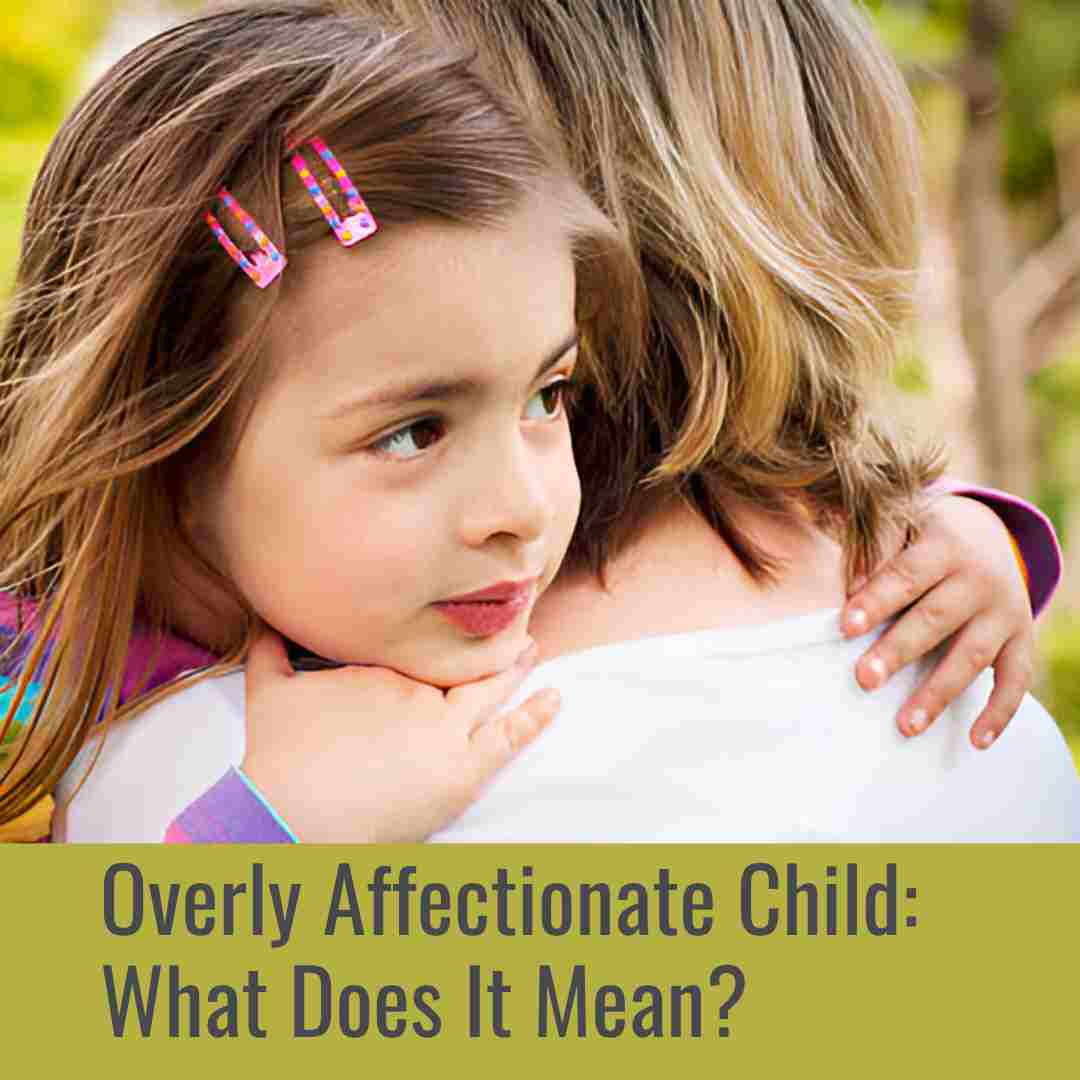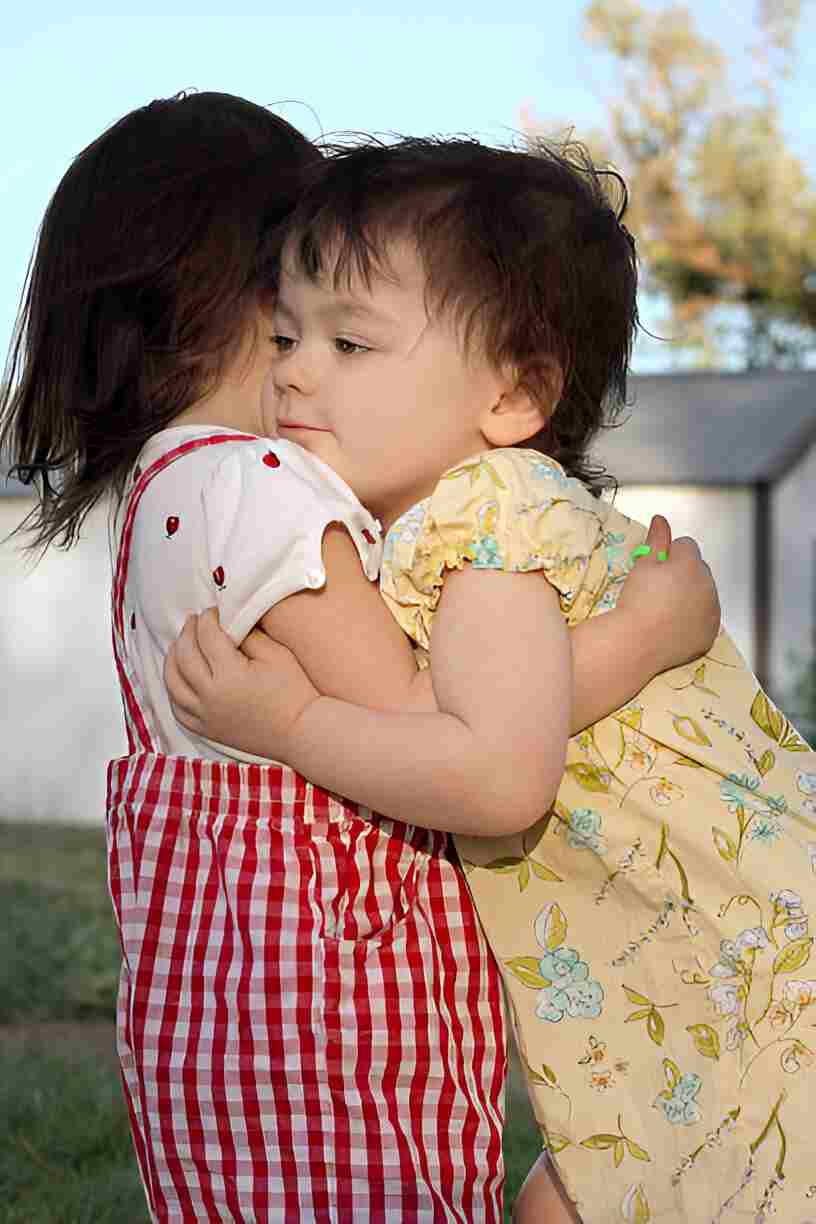Overly Affectionate child: What does it mean?
As parents, educators, or simply as members of society, we often marvel at the innocence and warmth of children. Their unbridled enthusiasm for life and their genuine expressions of love can be heartwarming. However, when a child exhibits what might be considered “overly affectionate” behavior, many adults wonder: Is this normal? What does it mean?
This article discusses what it means when a child is overly affectionate, the possible reasons behind it, and how parents can guide their child toward healthy expressions of love while respecting personal space.

What Does “Overly Affectionate” Mean?
A child who is overly affectionate is clingy and exhibits excessive emotion. This includes heavy hugs and lingering kisses that go on longer than necessary. They might want to snuggle and sleep with you. They are extremely reliant and will even engage in the same behavior with complete strangers, depending on the situation.
They freely talk, hug, and kiss both strangers and friends. Should you observe your child engaging in all of the aforementioned behaviors, they may be labeled as overly affectionate.
Read this:
Signs Of An Overly Affectionate Child
- Discussing personal matters with strangers.
- Giving a random person a street hug
- Requesting to sleep or cuddle with a family member
- Perching on a guest or visitor’s lap at home.
- Requesting hugs more frequently.
- Being overly attached to family members.
- Requesting personal care from a non-family member.

Reasons For A Child To Be Overly Affectionate
Overly affectionate parents frequently result in their children becoming overly affectionate as well, and children who mimic adult behavior are also prone to becoming overly affectionate.
The primary reasons why children are excessively affectionate are listed below.
- Absence of boundaries within families
- A natural, loving personality
- Sensory processing differences
- Seeking comfort and security
- Learned behavior.
- Caretakers’ neglect
- Cultural influences
1. Absence of boundaries within families.
A child will probably be impacted if a family lacks limits on showing affection. This could result in a child displaying inappropriate affection toward friends, family, or complete strangers. People around an excessively affectionate family are impacted, particularly the moderately affectionate ones.

2. A Natural, Loving Personality
Some kids are simply *wired* to be more affectionate. Just as some children are naturally shy and reserved, others are warm, expressive, and love physical closeness. If your child has always been this way and is well-adjusted, there may be no cause for concern.
3. Sensory Processing Differences
Some children, particularly those with Sensory Processing Disorder (SPD) or Autism Spectrum Disorder (ASD), may have different sensory needs. For some, deep pressure (such as tight hugs) is calming and helps regulate their nervous system. Others might struggle with recognizing personal space.

4. Seeking Comfort and Security
Children who feel anxious or insecure may use affection as a way to seek reassurance. Clinging to a parent, cuddling excessively, or constantly touching others can be a sign that the child is looking for emotional comfort.
5. Learned Behavior
Children imitate what they see. They see others kissing, embracing, and cuddling on TV, and if their parents do the same for one another, their child will follow suit and show the same affection to classmates and complete strangers. However, toddlers eventually stop engaging in these activities
6. Past Trauma or Neglect
Excessive affection can be a response to past experiences of neglect, trauma, or attachment issues. When children don’t feel loved and cared for enough at home, they may go outside and show their affection to strangers, friends, teachers, or anyone else they feel like it. Children who have experienced inconsistent care may develop an intense need for physical closeness as a way to feel secure.
7. Cultural Influences
Cultural background plays a significant role in how affection is expressed. In some cultures, constant physical touch and open displays of affection are the norm, while in others, personal space is highly valued. What may be considered overly affectionate in one cultural context might be perfectly acceptable in another.

Is it normal for a toddler to be overly affectionate?
Yes, it’s completely normal for a toddler to be overly affectionate! Toddlers, in particular, communicate through touch. A baby’s first interaction with his or her surroundings is through touch. They learn through touch as well. Touch plays an important role in cognitive development.
Toddlers are still learning about emotions, social boundaries, and how to express love. Some kids naturally crave more physical closeness, whether it’s hugs, kisses, or cuddles.
However, if a toddler’s affection seems excessive—like constantly clinging, struggling with separation, or ignoring personal space even when others show discomfort—it could be a sign they need extra reassurance or are seeking comfort.
Why Do Some Children Show More Affection Than Others?
Children are more affectionate than others depending on their personality and how they are treated at home. Parents’ warmth and affection for their children results in long-term positive outcomes for those children. It improves academic performance, improves parent-child communication, and reduces psychological and behavioral problems.
Children who do not have loving parents, on the other hand, have lower self-esteem, become hostile, anti-social, aggressive, and lonely. The negative impact of childhood abuse and lack of affection has a physical, mental and emotional impact on children.

How Do You Set Boundaries With Overly Affectionate Children?
1. Begin the conversation early.
Assist your child in determining who they feel safe and at ease with.
2. Establish limits.
Inform them that everyone has different levels of comfort with physical contact and personal space. They should not be forced to hug or kiss someone, especially if they do not feel like it. Allowing your child to make his own decision will teach him that it is acceptable to say no and that he can also wave, shake, or give a high five.
3. Specify what is appropriate and inappropriate.
Teach your child to trust their instincts and to recognize when something is inappropriate or makes them feel uncomfortable.
Inappropriate behavior could be an adult asking a child to keep a secret, bad jokes, sexual touching, or giving a child alcohol. The child should learn to say no and to stand firm.
Additionally, children can have a healthy relationship with an adult if the adult respects the child, uses appropriate language and tones, and discusses healthy communication.
4. Maintain your composure.
Your child looks up to you as a parent or guardian, and how you react to life situations. If your child says something that will weigh you down or that you don’t want to hear, try to keep your cool as much as possible. If the need arises, you can seek assistance.
5. Keep a close eye on your child.
Allow your child to express themselves, their successes, concerns, or questions. Make it clear that you care about them and want to know what makes them happy, what is important to them, and what makes them sad, upset, or frustrated.
6. Consider your child’s limits.
Listen to your child. Accept it if he says something is not okay or it is okay for them. Please respect your child’s decision if he does not want to be hugged and pecked.
7. Report any potential abuse.
There are various love languages, and physical touch may be your child’s primary love language. It will be aggravating if your child continues to touch you if your love language is different.
Why Is My Child Excessively Fond of Strangers?
Disinhibited Social Engagement Disorder (DSED) could be affecting your child. A child with DSED is overly friendly and comfortable with strangers. They are not afraid of strangers and may even seek assistance from them. They approach unfamiliar adults with no hesitation, displaying overly familiar verbal or physical behavior. They can have strong attachments to their parents while also being friendly to strangers.
When Should You Stop Cuddling Your Child?
Cuddling is as essential as saying ‘I love you’ to someone. Physical affection makes children feel loved and appreciated. Your cuddles assist children in dealing with stress. Children require cuddles as well as other forms of loving, affectionate touch, and they must observe their parents behaving physically affectionately with one another.
Not only does cuddling improve the parent-child bond, but it also benefits children’s mental and emotional development. The children who get cuddles will grow up to be more successful. As wonderful as cuddling is for strengthening your relationship with your child, there should be a limit.
When your child reaches the age at which cuddles are no longer appropriate, it is important to know. It could be three or four years old at this point. Nobody is advocating that it’s improper to cuddle your child.
In the end, having an overly affectionate child isn’t necessarily a bad thing—it often means they feel safe, loved, and connected. However, if their behavior seems excessive, intrusive, or socially inappropriate, it’s worth gently guiding them toward healthy boundaries. Every child is different, and their expressions of affection will evolve as they grow. With patience, reassurance, and a bit of redirection, you can help them develop a balanced approach to showing love while respecting personal space.

